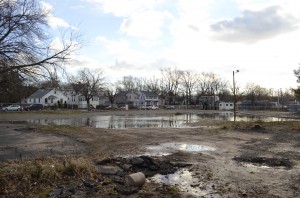Previously approved polices for the University of New Haven’s educational facilities zone may now be reconsidered by the West Haven Planning and Zoning Commission after residents voiced their concerns.

Last week, the rest of UNH’s latest expansion plan, which includes a new dormitory on the corner of Ruden and Isador Streets near the Dunham and Winchester Halls, , was tabled following the request of the college’s attorney.
The planned 90,000 square-foot facility will house 350 to 400 students.
The University strives for the suite-style design to enhance the University’s living learning communities and provide for smaller communities within the residence hall. In addition to residential space, plans include a full-service, 300-seat dining facility, classrooms, student activity space, a multi-purpose classroom theatre space with state-of- the-art technology, and parking for UNH resident students, faculty and staff.
“The University of New Haven has become very popular and we want to make sure those students who want to live on campus can do so. As we build this new residential facility, we will insure that we have the students’ best interests in mind and develop a facility they will use to the fullest extent possible,” said James McCoy, vice president for enrollment management.
However, new zone was only approved by the PZC earlier this month, and the decision from the Inland Wetland Agency concerning the building plan still has to be made.
“I’m very concerned regarding the setback regulation, that it’s zero,” resident Gail Carroll said to the New Haven Register. “They could build a six-story building against someone’s property line.”
In addition to residents’ concerns about the new zone’s lack of a setback requirement, they also said they were frustrated the new zone does not require that buildings have special permits. With no special permits, no public hearings would need to be held during the approvals process.
George Synodi, Vice President for Finance at UNH says that the steps being taken now are typical, and that it is reasonable to reconsider having a minimum setback requirement.
Synodi explained it’s reasonable to expect a setback requirement if the educational facilities zone abuts a residential area. However, under other circumstances where the university owns both sides of the road, such as along Ruden Street where there are the apartments for freshmen residents and North Campus, there should not be such a requirement.
John Panza, former PZC chairman, said the educational facilities district should require special permits, and therefore public hearings, for buildings proposed in that zone so that residents’ opinions can be heard.
“I don’t think this was well-planned. I think some grave mistakes were made here,” Panza told commissioners.
Joseph Williams, an attorney for UNH, says the educational facilities zone would provide “more flexibility” in constructing buildings for educational uses and that the zero-setback requirement just means there is no minimum setback. The dorm up for consideration does have a setback.
Synodi also explained that the generic nature of the zone’s title, “educational facilities zone,” allows it to also be used by others such as Notre Dame High School and surrounding facilities.
“In some places and with the right design plan, that can be deemed appropriate. So the intent is to allow that flexibility, but the commission still looks at other factors … it does not mean the commission is required under any circumstance to approve a building with no setback,” Williams said.
Williams acknowledged he heard about residents’ concerns regarding a setback and will evaluate the existing terms of the new zone. He said he had not been told they were also worried about the lack of a special permit, and since the city’s approval process is already extensive, the new zone’s terms do not require a special permit.
At the meeting earlier this month, Williams noted the PZC let residents speak about the dorm project regardless that both special permits and public hearing are not required.
Since UNH still had to submit an additional application related to the dorm’s construction to be presented at a February meeting, a request to delay a vote on the dorm plan until February was made by Williams. A member of the planning team was also unable to attend the meeting, which added to the delay.
Commissioners were generally open to taking a second look at the new zone. “UNH is the only place that has that zoning for now. With this zero setback, I don’t think it should be a point of contention and is something I think can be revisited. We can consider changing that number,” PZC member Christopher Suggs said.
The groundbreaking is planned for spring 2013, and scheduled to be open for student residents in the fall of 2014. Synodi expects to remain on target for the construction to begin after graduation in May.
This housing is seen as a necessity for UNH, due to its continuously increasing enrollments of approximately 6,400 students, including nearly 1,800 graduate students and more than 4,600 undergraduates, the majority of whom reside in University housing.












